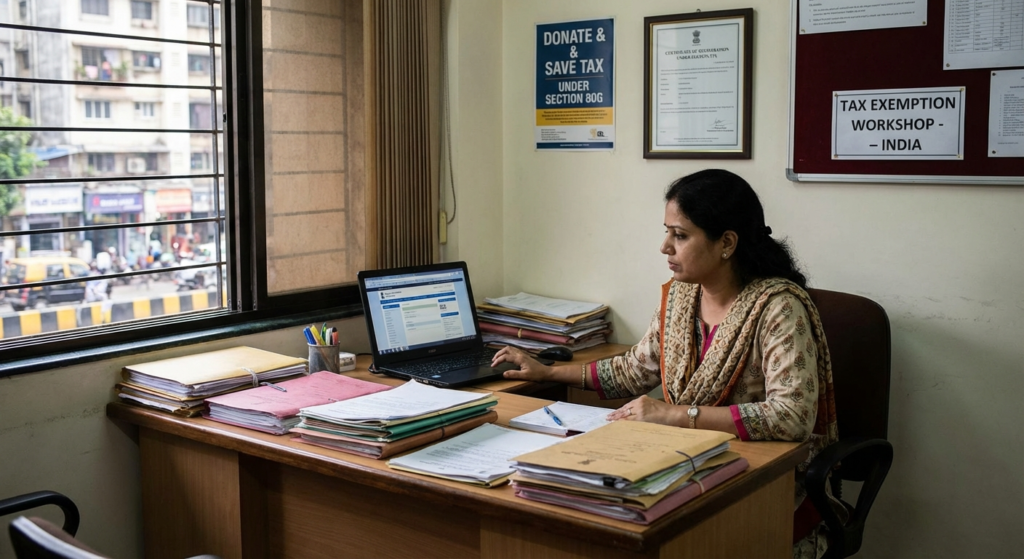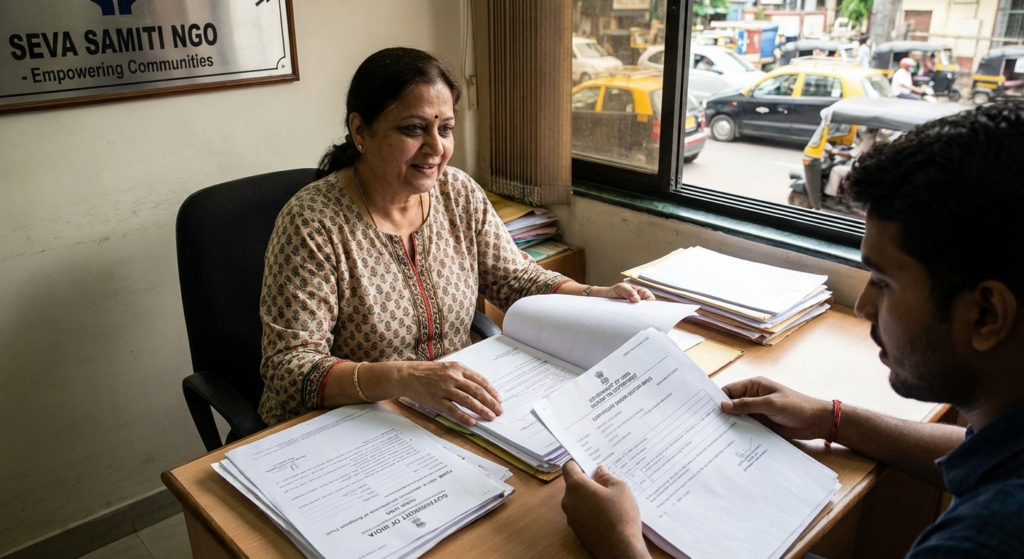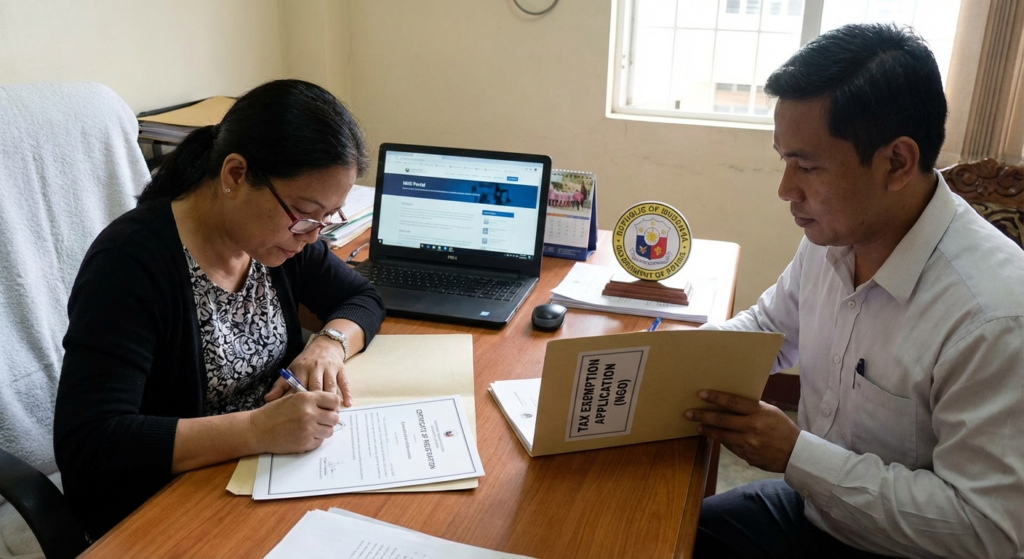Did you know that donations over 5% of a trust’s total or Rs 1,00,000 are taxed at 30%? This fact shows how complex and crucial understanding charitable trust taxes in India is. These trusts help with economic growth and social welfare. The Indian government offers tax breaks to support them. But, figuring out charitable trust taxes can be tough.
This article will give you a full view of charitable trust taxes in India. You’ll learn about benefits, exemptions, how to register, and what rules to follow. Knowing about charitable trust taxes helps your organization follow the rules and use tax breaks well.
Key Takeaways
- Charitable trusts get tax breaks and exemptions under Section 11 of the Income-tax Act.
- Some incomes, like secret donations and money not used for charity, are taxed.
- Trusts must spend at least 85% of their income on charity to get tax breaks.
- To register, trusts must submit documents and get approval from the Prescribed Authority.
- Trusts must follow investment rules and get audited to keep their tax-free status.
Introduction to Charitable Trusts
Definition and Purpose of Charitable Trusts
Charitable trusts are groups that help others without making money. They aim to do good for the public. The word ‘Charity’ means helping others, not just yourself. These trusts can help with charity, religious causes, or both. They find and help those in need, which is key to social welfare.
Role of Charitable Trusts in Society
Charitable trusts are key to helping India grow and care for its people. They spot those in need and offer support, working alongside the government. These trusts tackle many issues, like helping the poor, education, health, protecting nature, and more. By doing this, they make society a better place for everyone.
Income Tax Exemptions for Charitable Trusts
Charitable trusts in India can get big tax breaks under Section 11 of the Income Tax Act. To get these charitable trust tax exemption, the income must come from properties used only for religious or charity. The trust also needs a registration under Section 12A or Section 12AA of the Act.
Conditions for Income Tax Exemption under Section 11
To get the tax exemption under section 11, charitable trusts must meet certain conditions for section 11 exemption:
- The trust’s books of accounts must be checked by a Chartered Accountant. The Audit Report and Income Tax returns must be filed on time.
- Donations to the trust must be for things listed in Section 12 of the Act, which outlines the requirements for charitable trust tax benefits.
- The trust can’t be made for a specific religious group or community.
By following these strict conditions for section 11 exemption, charitable trusts can get the charitable trust tax exemption and other tax benefits under the Income Tax Act.
“Charitable trusts play a vital role in supporting social welfare activities and must be incentivized through appropriate tax benefits.”
What Qualifies as Charitable Purpose?
In India, the charitable purpose covers many activities that help society. These include helping the poor, teaching, giving medical aid, protecting nature, and improving public services. Such activities aim to make life better for everyone.
To be a charitable trust, an organization must focus on charitable goals and not just serve one religion. It must use all its income for charitable work and avoid making money from business.
| Charitable Trust Qualifying Activities | Examples |
|---|---|
| Relief of the poor | Providing food, shelter, and medical assistance to the underprivileged |
| Education | Operating schools, colleges, and vocational training centers |
| Medical relief | Running hospitals, clinics, and healthcare centers |
| Environmental preservation | Initiatives to protect and conserve natural resources, such as forests and wildlife |
| Advancement of public utility | Projects that benefit the general public, such as infrastructure development or community welfare programs |
Charitable trusts can get tax breaks for buying assets, paying off loans, covering costs, and giving to other charities. By focusing on charitable goals, these groups get tax perks and help society.
Taxation of Charitable Trust
Categories of Income Subject to Tax
The Income-tax Act gives exemptions for charitable trusts, but some income is taxed. This includes voluntary contributions that don’t go into the trust’s main funds. Also, anonymous donations over the higher of 5% of all donations or Rs. 1,00,000 are taxed at 30%.
Anonymous Donations and Taxation
The Income-tax Act has rules for taxing anonymous donations to charitable trusts. Donations for religious causes are tax-free. But, donations to medical or educational institutions or other non-religious causes are taxed under Section 115BBC. Any anonymous donations over the higher of 5% of all donations or Rs. 1,00,000 are taxed at 30%.
| Types of Income Taxed for Charitable Trusts | Tax Rate |
|---|---|
| Voluntary contributions without a specific direction to form part of the corpus | Taxable as part of the income from property held under trust |
| Anonymous donations exceeding the higher of 5% of total donations or Rs. 1,00,000 | 30% |
Registered charitable trusts face various tax rules, like taxes on business income and rental income. They also pay taxes on capital gains and Goods and Services Tax (GST) on some activities. Unregistered trusts are taxed like an Association of Persons (AOP), with their income taxed at the top rate. Understanding charitable trust taxes can be complex and often requires help from a tax expert or chartered accountant.

Application of Income for Charitable Purposes
Charitable trusts in India get big tax breaks, but they must follow certain rules. They need to use at least 85% of their income for charity or religious work in India. This money can go towards helping the poor, education, health care, protecting the environment, and more.
They can also use it for buying assets, paying off loans for assets, everyday costs, and giving to other trusts. All these uses are seen as helping charity and get tax breaks.
Utilization of Income for Exempt Activities
- Relief of the poor
- Education
- Medical relief
- Preservation of the environment
- Advancement of any object of general public utility
If a trust doesn’t use 85% of its income for charity, it can save it for later. This way, it can still get tax breaks in the future.
| Qualifying Charitable Expenditures | Exempt from Taxation |
|---|---|
| Funds used for charitable activities | Yes |
| Purchase of capital assets | Yes |
| Repayment of loans for capital assets | Yes |
| Revenue expenditure | Yes |
| Donations to other registered trusts | Yes |
Following these rules helps charitable trusts keep their tax-free status. This lets them keep making a big difference in society.
Accumulation of Income by Charitable Trusts
Charitable trusts in India can save up to 15% of their income for later use. This money is tax-free if they meet certain rules. This rule helps them grow their funds for charity or religious work.
Conditions for Accumulating Income
To get tax breaks, trusts must follow these steps:
- They must file Form No. 10 online before the deadline for their tax return. This form explains why they’re saving the money.
- They have to put the saved money into approved places, as the law says.
- They must use the saved money within five years, unless stopped by a court order.
- They can’t give the money to another trust or group, except under special situations like when a trust ends.
If they don’t follow these rules, the saved money could be taxed. The tax officer can also change the use of the money in some cases.
Remember, the law lets charitable trusts save up to 15% of their income for future charity or religious work. This rule helps them grow their funds for the long term. It lets them help the community more effectively.
Investments Permitted for Accumulated Income
Managing your charitable trust’s income is key. The Income Tax Act outlines specific investment options for these funds. These options help keep your trust tax-free and follow the law.
The allowed investments for your trust include:
- Government saving certificates
- Deposits in post office savings banks or scheduled banks
- Investment in immovable property
- Government securities
- Debentures fully guaranteed by the Central or State Government
- Deposits with or investment in bonds of public sector companies
- Other modes as per the Central Government’s directions
It’s vital to invest your trust’s income in these options. This keeps your trust tax-free and legal. Following these investment guidelines for accumulated charitable trust income protects your trust’s future. It also helps you keep supporting your community.
| Investment Option | Description |
|---|---|
| Government Saving Certificates | Safe and secure investment options backed by the government |
| Bank Deposits | Deposits in post office savings banks or scheduled banks for capital preservation |
| Immovable Property | Investment in real estate assets, subject to certain conditions |
| Government Securities | Bonds and securities issued by the Central or State Government |
| Guaranteed Debentures | Debentures fully backed by the government, offering stability |
| Public Sector Bonds | Investments in bonds issued by public sector companies |
By following these permitted investments for charitable trust accumulated income, your trust manages its assets well. It stays legal and supports your mission.
Taxation of Charitable Trust: What You Need to Know
Charitable trusts in India face certain tax rules. Income from property for charity or religious use is usually tax-free. This is true if at least 85% of the income goes to the trust’s goals. This rule applies to income from properties in India or abroad.
For a trust to be considered “charitable”, its work must help the poor, educate people, provide medical aid, protect the environment, or improve public welfare. Trusts can save up to 15% of their income for future charity or religious use. They must invest this money in ways allowed by the Income-tax Act.
Donations without names can be taxed if they add up to more than the higher of 5% of all donations or Rs. 1,00,000. In such cases, a 30% tax applies.
- Income from property for charity or religious use is tax-free if 85% goes to the trust’s goals.
- Charitable work includes helping the poor, educating people, giving medical aid, protecting the environment, and improving public welfare.
- Trusts can save up to 15% of their income for future charity or religious use, under certain conditions.
- These saved funds must be invested as the Income-tax Act says.
- Donations without names over the specified amount are taxed at 30%.
To get tax exemptions, charitable trusts must register under Section 12AA and meet other requirements. Keeping accurate records, filing returns, and passing audits is key to keeping tax-exempt status. Knowing these rules is vital for charitable trusts to follow the law and get the most benefits.

Registration Process for Charitable Trusts
To get tax exemptions under Section 11 and Section 12, charitable trusts in India need a Section 12AA registration. They must send in several important documents to the right people.
Documents Required for Registration under Section 12AA
Here are the documents you need for charitable trust registration:
- PAN (Permanent Account Number) card
- List of donors
- Memorandum of Association (MoA) and Registration Certificate
- Certificate of Incorporation
- No Objection Certificate (NOC)
- Documents related to IT returns, bank statements, and books of accounts for the last 3 years
- Form 10G
- A complete list of welfare activities
- The Trust Deed (in case of a Trust)
- Copies of the latest utility bills or property tax receipts
- A detailed list of the Board of Trustees
After sending these documents, you can start the Section 12AA registration process. Getting this approval is key for charitable trusts to get tax breaks and do their welfare work legally.
“Registering a charitable trust in India is an essential step to have a positive impact on the local community and carry out charitable activities within the legal framework.”
Approval under Section 80G
Charitable trusts and institutions can get approval under Section 80G of the Income-tax Act. This lets donors get a tax break for their contributions. You’ll need things like a PAN card, donor lists, and some legal documents to get this approval.
Section 80G of the Indian Income Tax Act lets you deduct taxes for giving to certain funds and charities. People like individuals and companies can claim these deductions. But, you must give to funds that are approved for these deductions.
| Deduction Limit | Donation Criteria |
|---|---|
| 100% deduction without limit | Donations to National Defence Fund, Prime Minister’s National Relief Fund, and others |
| 50% deduction without limit | Donations to Prime Minister’s Drought Relief Fund and others |
| 100% deduction with limit | Donations for family planning or sports development, subject to a maximum limit |
| 50% deduction with limit | Donations for repairs of religious places or charitable purposes, subject to a maximum limit |
You can claim deductions under Section 80G with a cheque, demand draft, or cash (for small donations). But, donations over Rs 2,000 in cash don’t count. The tax savings depend on your tax rate.
When claiming Section 80G deductions, you’ll need receipts and trust numbers. Section 80GGA also offers deductions for donations to research or rural development, but not for business income.

Audit Requirements for Charitable Trusts
Charitable trusts and institutions with more than the tax-free limit need a financial audit by a Chartered Accountant. They must file the audited financial statements and the Audit Report with their Income Tax returns on time.
This audit makes sure the trust’s money and spending are properly recorded. It helps the tax authorities check if the trust follows the Income-tax Act rules. The audit rules for charitable trusts changed in the Budget 2023. Forms 10B and 10BB started on April 1, 2023.
Audit Rules and Criteria
Starting April 1, 2023, new Income Tax Rules changed how charitable trusts and institutions are audited:
- Trusts under Section 10(23C) need to file Form 10B if their income is over ₹5 crore, they get foreign donations, or use their income abroad.
- Trusts under Section 12A must file Form 10B or 10BB if their income is high, they get foreign donations, or use their income abroad.
- These rules now cover all charitable trusts, institutions, and NGOs under Section 12A or Section 10(23C), no matter their income.
The deadline to file these audit reports is usually September 30 of the next year. Not following these audit rules can cause a trust or institution to lose its tax-exempt status and lead to penalties.
Recent audits found many issues and cases of misuse of funds by charitable trusts. This shows why good financial reporting and oversight are key. The government wants to make sure charitable funds are used as they should be through these new audit rules.
Appeals and Dispute Resolution
As a charitable trust, you might face tax disputes with the authorities. The appeals process lets you challenge any decisions that affect your trust’s status. It ensures your tax matters are looked at fairly and without bias.
If you’re unhappy with a decision under Section 12AA or Section 80G, you can appeal to the Income Tax Appellate Tribunal (ITAT). The cost to file an appeal depends on your income:
- Rs. 250 for assessed income of Rs 1 lakh or less
- Rs. 500 for assessed income more than Rs. 1 lakh but less than Rs. 2 lakhs
- Rs. 1,000 for assessed income more than Rs. 2 lakhs
You must file your appeal within 30 days after getting the notice of demand. If you have a good reason, the Commissioner of Income-tax (Appeals) might accept new evidence later.
The ITAT has both Judicial and Accountant members. It’s the second place to appeal after the Commissioner of Income-Tax (Appeals). You or the Assessing Officer can appeal to the ITAT. The department can only appeal if the tax impact is over Rs. 10,00,000. The ITAT must make a decision within 15 days after the last hearing.
“The appeals process is a crucial safeguard for charitable trusts, ensuring their tax-related disputes are resolved fairly and impartially.”
Knowing the appeals process for charitable trust tax helps you handle recourse for charitable trusts on tax matters and dispute resolution for charitable trust taxation. This way, you can protect your trust and keep its tax-exempt status.
Investment Guidelines for Charitable Trusts
Managing a charitable trust’s investments comes with specific rules to keep its tax-exempt status. The Income Tax Act in India outlines where charitable trust funds can be invested. This ensures these groups follow good investment practices and use their funds as intended for charity.
The investment rules for charitable trusts include the following approved investment avenues:
- Government savings certificates
- Deposits in post office savings banks or scheduled banks
- Investment in immovable property
- Government securities
- Debentures fully guaranteed by the Central or State Government
- Deposits with or investment in bonds of public sector companies
- Other modes as per the Central Government’s directions
Charitable trusts must invest their money only in these permitted investments for charitable trusts. This keeps their tax-exempt status. Not following the investment guidelines for charitable trust funds can lead to losing tax benefits and more scrutiny from regulators.
| Investment Type | Regulatory Requirements |
|---|---|
| Government savings certificates | Must be held until maturity |
| Bank deposits | Deposits must be with scheduled banks |
| Immovable property | Property must be held for charitable purposes |
| Government securities | No specific restrictions |
| Debentures | Must be fully guaranteed by the Central or State Government |
| Public sector bonds | Investment must be in bonds of public sector companies |
Following these regulatory requirements for charitable trust investments helps charitable trusts use their funds well. It also keeps their tax-exempt status, letting them keep helping the community.
“Proper investment of funds is crucial for charitable trusts to maximize their impact and maintain their tax-exempt status.”
Exemptions for International Welfare Activities
Charitable trusts and institutions in India can get tax breaks for their work abroad. This is if their work helps with international welfare and India is involved. The Income Tax Act spells out these tax benefits for charity work around the world.
If a trust was set up before April 1, 1952, it can get tax breaks for money used for charity or religious work abroad. Trusts made after that date can also get deductions for global welfare efforts that include India.
The Central Board of Direct Taxes (CBDT) can decide that such income doesn’t count towards the trust’s total earnings. This means the trust won’t have to pay taxes on it. This lets trusts doing global charity work have a bigger impact.
To get these tax breaks, trusts must follow certain rules. They need to be registered and use most of their income for charity or religious causes.
By using tax breaks for international work, Indian charitable trusts can help more people worldwide. They also get better tax treatment for their work abroad.
Conclusion
In conclusion, charitable trusts in India follow strict tax rules under the Income-tax Act. These trusts help the government’s social welfare goals and get tax breaks. But, they must meet certain conditions to get these benefits. This includes registering under Section 12AA, getting approval under Section 80G, keeping accurate records, and using their money for charity or religious causes.
By following these rules, charitable trusts can get the most from tax benefits. They can keep doing great work in the community. The main points are to register correctly, follow investment rules, and use money for approved charities. This summary and final thoughts show how important these groups are for India’s social and economic growth.
The tax rules for charitable trusts in India aim to support these important groups while preventing misuse of tax benefits. By keeping up with new rules and best practices, charitable trusts can handle taxes well. This lets them keep making a big difference in people’s lives.
FAQ
What is the definition and purpose of charitable trusts?
What are the tax exemptions available for charitable trusts in India?
What qualifies as a charitable purpose under the Income-tax Act?
What types of income are subject to taxation for charitable trusts?
How can charitable trusts accumulate and invest their income?
What are the registration and approval requirements for charitable trusts to claim tax exemptions?
What are the audit requirements for charitable trusts?
Can charitable trusts appeal against orders related to their registration or approval?
What are the investment guidelines for the funds of charitable trusts?
Are there any exemptions for income utilized by charitable trusts for international welfare activities?
Please Rate this post
Click to rate











